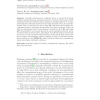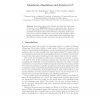162
click to vote
NC
2011
14 years 9 months ago
2011
We apply techniques from complexity theory to a model of biological cellular membranes known as membrane systems or P-systems. Like Boolean circuits, membrane systems are defined ...
114
click to vote
TCS
2002
15 years 1 months ago
2002
Membrane systems are models of computation which are inspired by some basic features of biological membranes. In a membrane system multisets of objects are placed in the compartme...
CORR
2004
Springer
15 years 1 months ago
2004
Springer
In this paper we introduce a fuzzy version of symport/antiport membrane systems. Our fuzzy membrane systems handle possibly inexact copies of reactives and their rules are endowed...
102
click to vote
ITA
2006
15 years 2 months ago
2006
Abstract. We compare various computational complexity classes defined within the framework of membrane systems, a distributed parallel computing device which is inspired from the f...
122
Voted
FUIN
2006
15 years 2 months ago
2006
We introduce a new variant of membrane systems where the rules are directly assigned to membranes and, moreover, every membrane carries an energy value that can be changed during a...
116
click to vote
DAGSTUHL
2006
15 years 3 months ago
2006
ed Abstract Membrane systems are models of computation inspired by the structure and the function of biological cells. The model was introduced in 1998 by Gh. Paun and since then m...
117
click to vote
ICTAC
2004
Springer
15 years 7 months ago
2004
Springer
Abstract. P systems (known also as membrane systems) are biologically motivated theoretical models of distributed and parallel computing. The two most interesting questions in the ...
108
click to vote
MEMBRANE
2007
Springer
15 years 8 months ago
2007
Springer
In this paper we introduce a variant of membrane systems with elementary division and without charges. We allow only elementary division where the resulting membranes are identical...
UC
2009
Springer
15 years 8 months ago
2009
Springer
Membrane systems with dividing and dissolving membranes are known to solve PSPACE problems in polynomial time. However, we give a P upperbound on an important restriction of such s...


